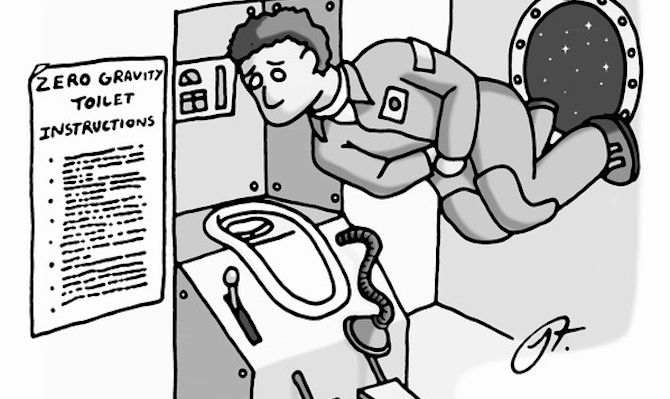Congratulation to my cousin Eunice Barbara C. Novio for coming up with an article at Rappler
titled “Coming soon: Filipino food in
space”. Please click HERE and read and at least be informed on how Filipino delicacies would
invade the space soon. This is a story about NASA Filipino scientist Apollo
Arquiza working at the space agency’s Advanced Cookware and Techniques for Food
Preparation for its Mars Space Mission in 2030. Reading her story, I became
curious to know how the astronauts poop and pee in space. If Eunice’s story is about food
preparation for Mars Expedition or on making possible cooking in space, mine is about poop-ing and pee-ing or the "human waste
management systems" in outer space.
I
did a little reading and "consulted" Cecil Adams, my ever trusted “straight doper”.
In the early years of space missions, according to him, “waste management systems” were primitive. The
feces were collected in a plastic bag (AKA “Apollo Bag”) that is glued to the
astronaut’s behind during poop-ing and when pee-ing, a hose attached to a bag
was worn by the spaceman. How about in women? Adam was adamant (?) in that aspect.
Then
the Skylab came and later the space shuttle, a “space toilet” was designed by
the NASA people. As our teacher in elementary science taught us that there’s
lack of gravity in space and the fact that while gravity plays an important
role in unloading poops and pees on earth, that would be a big problem up
there. But modern space technology made this easy. Here’s the LINK describing
vividly how “space toilet” works then during Adams' time in the 1990s.
In
the Mars Mission which is set to embark in 2018, Taber MacCallum, member of the
Inspiration Mars planning team, said in THIS report that human waste makes
great radiation shielding, so it’ll be stuffed into bags and then lined along
the walls of the ship. Their poops will stay with the astronauts for 501 days
until they come back to Mother Earth. This is the yuckiest: The human poops will
be dehydrated, so the waste water can be recycled for drinking. The solid part
would remain in the spacecraft but controlling the smell is at present being
taken care of by the team.
In
that same news report by James Plafke posted March 4, 2013, he explained, “On a spacecraft, there isn’t exactly a
plumbing system that leads to a large plant somewhere upstate, so there isn’t
anywhere for urine or fecal matter to go.” But it would be fixed in the
future, I am sure.
Just for laughs, I
imagine, too, Malabanan soon in space …
------
(Photo wetravelandblog.com)







Dr. Apollo might not like the term "Apollo bag", but I guess he must deal with it. He is such a great guy; small in stature but definitely big in thinking.
ReplyDelete